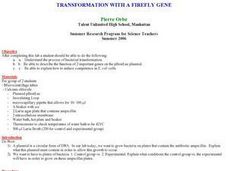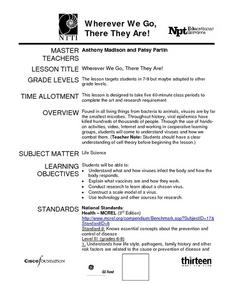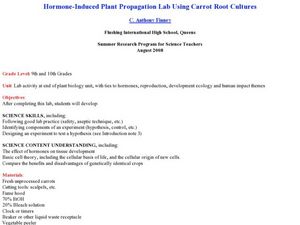Curated OER
CHAOS AND COMPUTERS
Students discuss the Chaos Theory and how it came into existence.They observe order and compare it to the randomness of chaos. The lesson plan features the playing of a game to reinforce concepts.
Curated OER
Cloning
Students view the history to cloning cats. Students show examples of what they know about cloning. Students surf the net on all theories on cloning. Students view the critics views on cloning.
Curated OER
Transformation With A Firefly Gene
Students understand the process of bacterial transformation through experimentation. They describe the function of two important genes of the pBestLuc plasmid. They explain how to induce competence in E. coli cells.
Curated OER
Transformation of Energy-8th Grade
Eighth graders examine how electricity is produced in relation to the atom as well as what causes electric current to flow and what determines how much current flows through a circuit. These and other concepts of transformation of energy...
Curated OER
Creative Ways To Teach Evolutionary Concepts
Young scholars explore evolutionary concepts in cartoons and lab activities. They describe and explain evolutionary concepts featured in a cartoon and participate in laboratory activities.
Curated OER
Dinosaur and DNA Days
Biology stars extract DNA samples from beef thymus and then examine its properties. They use enzymes to digest the DNA samples, and then use electrophoresis to separate fragments. Finally, they discuss methods and principles of...
Curated OER
Wherever We Go, There They Are!
The central video for this lesson is not available through the included resource link. However, the activity that simulates the passing of a virus through a population is impacting and the other resource links are invaluable. Use this...
Colorado State University
What Is a "Model"?
Model the transfer of energy during a typical 24-hour period. Young scholars use a game-like approach to learning the patterns of heat transfer through the day and night. Groups of four exchange different tokens as the energy transfers...
Curated OER
An Electro-Olympic Event: Lemon vs. Lime
Learners design a battery, identify and label the anode, cathode, electron flow, ion flow, oxidation & reduction reactions, chemicals used including the location of each;and distinguish between anode materials with regard to energy...
Curated OER
Human Cloning: Is it Biological Plagiarism?
Is cloning good or harmful? Help your class understand the risks and benefits as they read, research, and discuss human cloning. Individuals form teams, research information, and present to the class before concluding with an in-depth...
Curated OER
Rock My World
Students conduct a hands-on experiment designed to demonstrate how continents and oceans formed and why the manner of formation is relevant to a study of volcanoes.
Curated OER
Remember This?
Students investigate the mechanics of an fMRI and the properties of neurons. In this biology instructional activity, students analyze the way the brain works by performing tests in the neurons in the brain. This is all done theoretically.
Curated OER
Genetic Testing
Complete a variety of activities to examine the pros and cons and ethical issues behind genetic testing. Your high school students will role play and examine various scenarios to determine if genetic testing is justified.
ReadWriteThink
Persuasive Techniques in Advertising
Help your 21st century learners develop their media smarts with this resource that has them examine the persuasive techniques advertisers use to influence specific demographics and then to use these techniques to craft their own ads.
Curated OER
Human Embryology
Ninth graders are introduced to the concept of human embryology. Individually, they complete an exercise in which they determine which trait they got from which family member. In groups, they identify and label the reproductive organs...
Curated OER
Go Fly a ( Tetrehedral) Kite!
Students research the tetrahedral kites invented by Alexander Graham Bell. In this components of flight lesson, students examine the kites made by Bell and his team. Students create their own kite and add them together as a class to...
Curated OER
Light Microscopes
Seventh graders study the parts of a light microscope, and its proper use. They identify each part and explain why it is important to know how to use this tool. They practice observing newsprint on a wet mount slide.
Curated OER
Feed Me, Seymour
Students work in small groups to create posters illustrating the major facts and functions of plant organs. Within their groups, they assume the role of specialists creating specialized posters pertaining to the different parts of plants.
Curated OER
Things Living in a Pond
Ninth graders observe, compare, and classify various microorganisms using a microscope. They answer discussion questions, and record their observations on a chart.
Curated OER
Coloring Interval Graphs
Students investigate planning an activity and getting it done on time. In this algebra lesson, students define vocabulary words related quadratic equations, including the vertex and intervals. They figure a good way to color graphs...
Curated OER
Mass Measurement
Middle schoolers explore geometry by completing a physics activity on-line. For this mass measurement lesson, pupils define the terms mass, volume, and density and identify their relationship with each other. They complete an on-line...
Curated OER
Virus Tracker
Sixth graders will simulate the spread of a virus such as HIV through a population by "sharing" (but not drinking) the water in a plastic cup with several classmates. Although invisible, the water in a few of the cups will already be...
Curated OER
Feedback and Flowcharts
Sixth graders explain what a negative feedback system is and they distinguish it from a positive feedback system. They describe examples of how negative feedback is used in both nature and technology. , Students define homeostasis, and...
Curated OER
Hormone-Induced Plant Propagation Lab using Carrot Root Cultures
Students evaluate the importance of hormones in living things. In this biology lesson, students experiment on carrots to differentiate how humans and plants reproduce. They collect data from experiment to answer analysis questions.
Other popular searches
- Cell Theory Scientists
- Cell Theory Rap
- Cell Theory Unit
- The Cell Theory
- Cell Theory Time Line
- Introducing the Cell Theory
- History of Cell Theory
- Microscope and Cell Theory
- Cell Theory Lesson Plan
- Cell Theory Timeline
- Biology Cell Theory
- Science Cell Theory

























